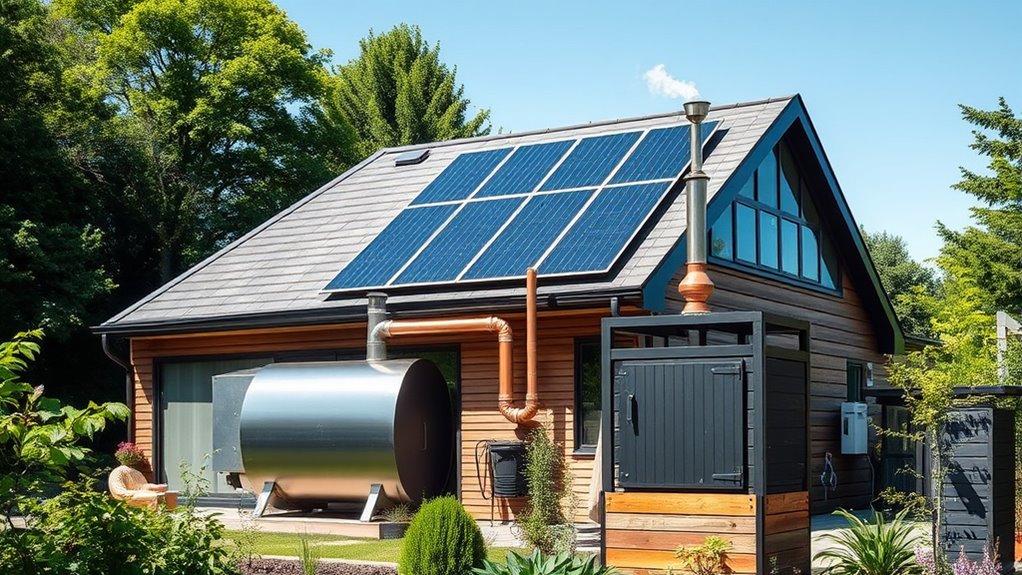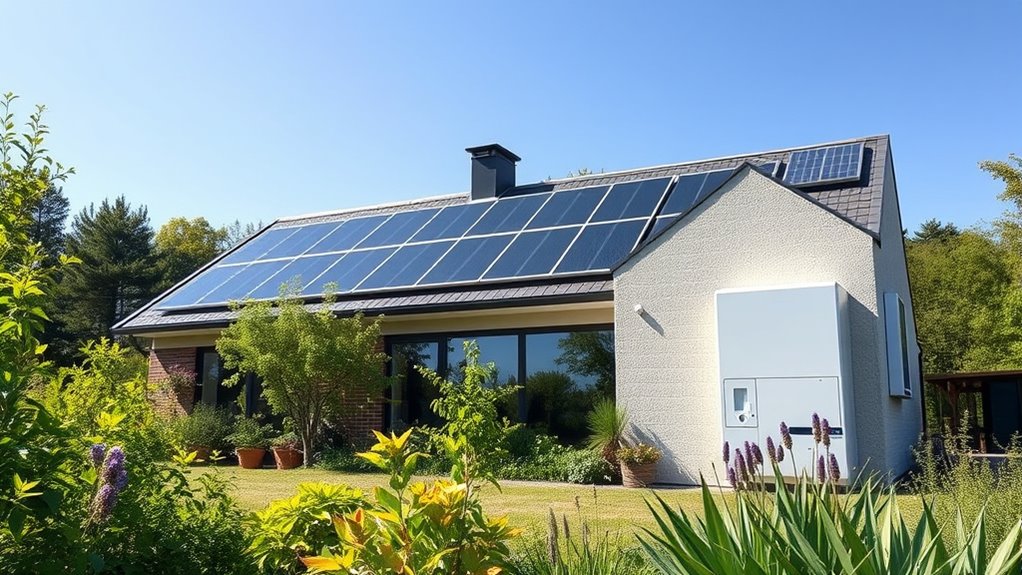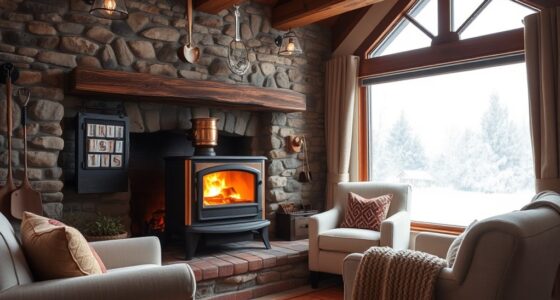The Future Homes Standards encourage you to adopt renewable, low-carbon heating solutions like biomass boilers to meet the UK’s sustainability goals. Biomass heating uses organic materials such as wood pellets, offering efficient, consistent heat that reduces your carbon footprint. It aligns with future regulations aiming to phase out fossil fuels and improve energy efficiency in homes. If you want to find out how biomass can help your home comply and become more resilient, there’s more to explore.
Key Takeaways
- Biomass heating aligns with Future Homes Standards by providing renewable, low-carbon heating solutions for new builds.
- Modern biomass boilers meet efficiency and emission standards mandated by upcoming regulations.
- Incorporating biomass supports compliance with UK’s future energy and sustainability targets.
- The technology offers a scalable, future-proof heating option reducing reliance on fossil fuels.
- Sourcing sustainable biomass fuels ensures compatibility with the UK’s commitment to renewable energy transition.

As the UK moves toward its Future Homes Standards, integrating sustainable heating solutions becomes essential. You need to consider how renewable integration can play a pivotal role in achieving this goal. Biomass heating systems stand out because they utilize organic materials, such as wood pellets or chips, to generate warmth efficiently. These systems can significantly reduce carbon emissions, aligning with the country’s commitment to greener energy. When you choose biomass heating, you’re not just opting for a renewable energy source; you’re also enhancing thermal efficiency within your home. Biomass systems are designed to maintain consistent heat output, which helps minimize energy waste. This means your home stays warmer for longer periods without constantly firing up the boiler, ultimately saving you money on energy bills and reducing your carbon footprint.
Thermal efficiency is at the core of the UK’s future standards, and biomass heating supports this focus effectively. Unlike traditional fossil fuel boilers, biomass systems are optimized to extract maximum heat from the fuel they burn. This optimization ensures you’re getting the most energy possible from each unit of biomass, making your heating system more effective and environmentally friendly. Furthermore, modern biomass boilers are equipped with advanced controls that allow precise regulation of temperature and combustion, further improving thermal efficiency. As a homeowner, you benefit from these innovations because they help deliver consistent comfort while aligning with strict future regulations on emissions and energy use.
Implementing biomass heating also encourages you to think about sustainable fuel sourcing. When you opt for biomass, you support a renewable cycle—plants absorb CO2 as they grow, and this carbon is released when the biomass is burned, creating a balanced carbon footprint. This renewable integration makes biomass a practical choice for future-proofing your home’s heating. Additionally, as the UK aims to phase out fossil fuel dependency, biomass offers a reliable alternative that can be scaled and adapted to different home sizes and energy needs.
Frequently Asked Questions
How Will Biomass Heating Impact Household Energy Bills Long-Term?
Biomass heating can lower your long-term energy bills by providing cost savings through improved energy efficiency. As biomass fuels are often cheaper than fossil fuels, you’ll notice reduced costs over time. Plus, its renewable nature means fewer fluctuations in prices. While the initial setup might be higher, the ongoing savings and environmental benefits make biomass heating a smart choice to cut your household energy expenses in the long run.
Are There Government Incentives for Installing Biomass Heating Systems?
Yes, you can benefit from government grants and incentive programs when installing biomass heating systems. Think of these incentives as a key that unlocks financial support, making eco-friendly choices more affordable. By applying for these programs, you reduce upfront costs and promote sustainable energy use. Keep an eye on local and national schemes, as they regularly update, helping you save money while contributing to a greener future.
What Maintenance Is Required for Biomass Heating Compared to Traditional Systems?
Biomass systems require regular maintenance to operate efficiently. You’ll need to clean the ash and soot from the boiler, check and replace filters, and guarantee the fuel feed system runs smoothly. Compared to traditional systems, biomass heating demands more frequent servicing, like ash disposal and system inspections. You should also schedule annual professional check-ups to keep your biomass system safe, efficient, and compliant with regulations.
How Do Future Homes Standards Affect Existing Biomass Heating Installations?
You’ll find that future homes standards might require you to upgrade your biomass heating system for better efficiency, especially as they emphasize building insulation and ventilation systems. These upgrades could mean installing smarter controls or improving insulation to meet new energy targets. While your existing biomass setup may still operate, you might need to adapt it to align with new regulations, ensuring your home remains compliant and energy-efficient.
Can Biomass Heating Be Integrated With Other Renewable Energy Sources?
You can definitely integrate biomass heating with other renewable energy sources through hybrid systems, enhancing overall efficiency and sustainability. By combining biomass with solar panels or heat pumps, you optimize renewable integration, reducing reliance on fossil fuels. This approach allows you to balance energy supply, improve system resilience, and lower emissions. Hybrid systems are flexible, ensuring your home benefits from diverse renewable energy sources, making your heating more eco-friendly and cost-effective.
Conclusion
As you step into the future, remember that your home is more than just bricks and mortar—it’s a beacon of hope and sustainability. Embracing biomass heating symbolizes a commitment to nurturing the Earth, like planting a seed that will grow into a greener tomorrow. By adopting these standards, you’re not just building a house; you’re cultivating a legacy of innovation and care. Together, we can turn the page toward a brighter, more sustainable chapter for generations to come.










